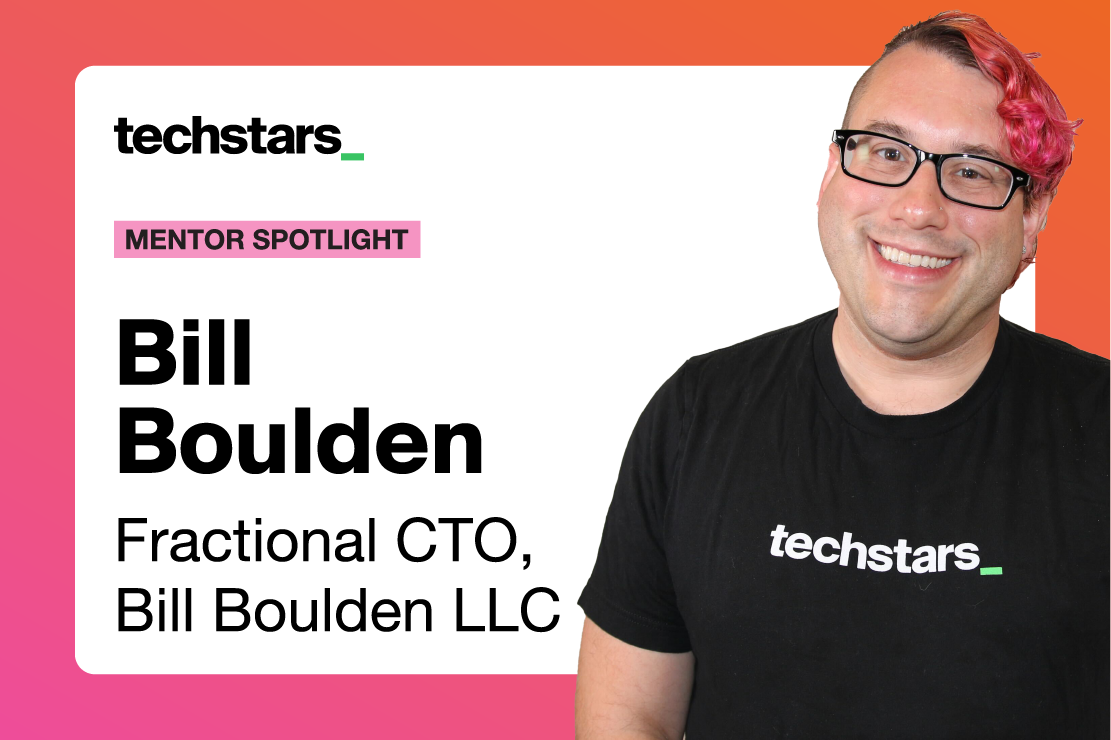Techstars Mentor Bill Boulden Introduces the "Bookkeeper Test"
Aug 19, 2024

Bill Boulden has been developing for 34 years, professionally for 23, and has only ever worked for tech startups. After some successes in the 2010s, Boulden embraced a "Fractional" lifestyle in 2019, building and launching MVPs rapid fire every few months. In that time, they have been a key player in 22 different product launches, and attended and then became the All-Star Mentor for the Techstars Atlanta Powered by Cox Enterprises program. Boulden is in their fourth consecutive cohort and tries to mentor all ten startups if possible. Boulden has worked for six Techstars alums, two YCs, and two 43 Norths. In their spare time, they are the prolific music producer "Downupright," best known for the Sixty Genres In Sixty Minutes album.
Why are you a mentor with Techstars?
It's just too much... fun? I am addicted to creative problem solving and if it wasn't for Techstars' formal mentorship program I would probably just be bouncing around looking for different problems to solve every week. I do it all day for compensation, then I keep doing it in my free time as a volunteer. Especially inside the tech vertical, I am greatly enthused by tricky puzzles. Not only that, but the enthusiasm and brilliance of the founders, especially these Atlanta IMPACT ones, continues to blow me away and renew my faith in humanity every day.
What advice do you find yourself giving most often to founders?
Something that breaks my heart every time is watching non-technical founders be misled by devs due to a sort of willful self-imposed exile from even trying to understand what’s going on with the code.
Many non-technical founders just hand-wave away the entire stack as some kind of mysticism, a sort of arcane ritual they wouldn’t dare tinker with, and therefore are somehow far less inquisitive about that part of their business than any other part!
I want to be really clear: while you shouldn’t actually try to like, get in there and code if you’re not a dev, you are allowed to ask what’s going on, and you are entitled to explanations of why. In fact, you kind of have to: you’re a tech founder.
But I want to introduce you to what I call the Bookkeeper Test. Imagine the following very reasonable scenario: you are not a trained, certified CPA, but you need somebody to do your books for you, and so you get a qualified CPA, and they say that they are doing your books.
If you said, “Well, can I see my books once they’re done?” and they said “No, you can’t see them at all, because you’d never understand them, you’re not a CPA, just take my word for it,” you’d fire them — that’s patently ridiculous. And if you asked a clarifying question like “Hey — this extra tax code I’m paying over here — why is that?” and they said “You would never get it,” rather than make a good faith effort to try to explain it to you in a reasonably dumbed-down language you could grok, you’d think they were a sociopath. And yet every day I watch founders shrug off this behavior from their devs.
I want to encourage you! Look, you’re smart, right? You’re actually a really smart cookie — you are smart enough and hardworking enough and self-starting enough to found an entire company, after all! So don’t just put less energy into grokking the tech than you do anything else.
What impact do you hope to make with the founders you mentor?
I know there are so many rocky shores tech startups can aground upon — consumer awareness, logistics, PMF, capital, etc. — but when I get involved, I just hope I can make sure they don't fail because of a tech problem. Whether it's a security breach, an infrastructure that can't stop crashing, or vendor bills that go through the roof, I want to show you how to be scrappy while maintaining polish and speed.
How do you encourage startups to stay innovative and adaptable in a rapidly changing market?
Don't believe the hype. There is an entire hype-manufacturing class that business PR quotas and LinkedIn posting frequency demand continually insist that you are being left behind if you aren't on the cutting edge of technology X. We have watched it over the last decade with social, crypto, NFTs, gambling, video content, web 2.0, web3.0, and now the Gen AI hype. Don't sweat it — these talking heads are trying to create FOMO. Keep your head down and focus on your special sauce and outsource everything else. My two very best startups right now include none of these technologies and are all easily things that could have existed in 2013.
What advice do you have for other mentors?
Listen to your founders with intent, and look for pattern recognition with things you've seen before. There's a template for nearly everything now and the path to success is littered with 80/20s — in both directions. Help them identify positive 80/20s where a small amount of effort creates a giant change, and avoid negative 80/20s, where a tremendous amount of effort does not move the needle.
